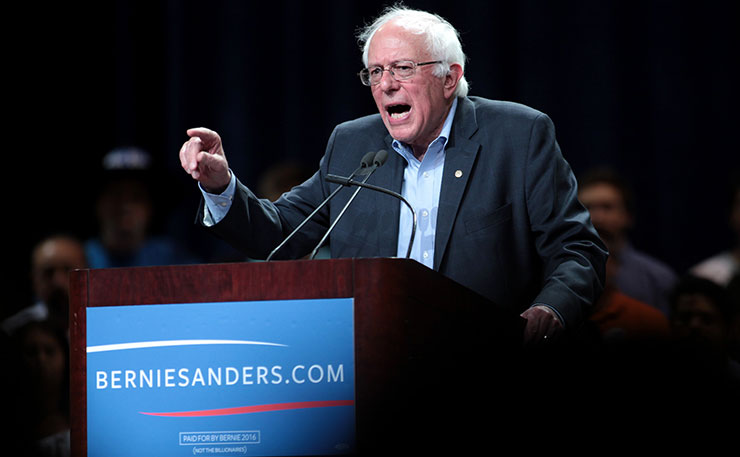The obsessively rehashed talking point does little for the progressive side of politics other than provide cover for Wall Street’s favoured candidate, writes Michael Brull.
Like many Australians, I’ve followed the American primary contest with interest. Bernie Sanders has inspired not just many young and progressive Americans, but indeed, many people around the world. He has boldly confronted big banks and the one percent, declaring that “I am dangerous to Wall Street”. His campaign has led many to hope that change in the American political system is possible. It has also led to a predictable backlash from American political and media elites who overwhelmingly threw their weight behind his opponent, Hillary Clinton.
As observed by economist Jeffrey Sachs, Clinton is the “candidate of Wall Street”, and “the candidate of the military-industrial complex”. Evidence for the former is legion. Back in 2014, Politico reported: “the big bankers love Clinton, and by and large they badly want her to be president… What about her forays into fiery rhetoric? They dismiss it quickly as political manoeuvres. None of them think she really means her populism.” When the token rhetoric came, a major Democratic donor from Wall Street explained it was “just politics”. Before the campaign began, from 2013-2015, she made $2.9 million in speeches to big banks. From April 2013, she made over $21 million from public speeches to other organisations, such as pharmaceutical companies. Clinton and her husband earned over $150 million in speeches since 2001. Sanders, on the other hand, earned a little over $200,000 in 2014 – $174 000 of that being his Senate salary.
Aside from that, Clinton’s campaign received $4.5 million from employees and lobbyists for fossil-fuel companies. Clinton long supported her husband’s policies which had a disastrous effect on black Americans. She backed a military coup in Honduras which overthrew its elected President Manuel Zelaya, supported the usual array of Arab tyrants, and as Secretary of State regularly consulted mass murderer Henry Kissinger for advice. Clinton promised to make the US even more supportive of the Israeli government, and has won the admiration of neocons and interventionists. This admiration is well-deserved: Clinton supported the war on Iraq in 2003, and was the “critical” figure in persuading Obama to bomb Libya in 2011. She supported war on the Assad government in Syria in 2013, and also supported a plan for the US to directly arm rebels in Syria, rather than merely continuing to funnel support through Middle Eastern client states.
In short, Clinton is in the pocket of the super-rich, backs American military might internationally, supports repressive dictators, and has a record of supporting Wall Street and policies that imprison and impoverish poor and black Americans. However, within the narrow spectrum of American politics, a progressive might still back Clinton. As the presumptive Democratic nominee, she may be judged a preferable president, on the grounds that her policies on gender are comparatively progressive, having a female president would be a meaningful milestone, or that a Republican president would be utterly disastrous, both for America and the rest of the world. An American voter might be horrified at the prospect of a Republican President, as Trump and Cruz both balance awful policies with rhetoric that legitimises overt bigotry. This may well be a good reason to vote for Clinton.
Yet even if a progressive case can be made for voting for Clinton, it is harder to make a case for supporting Clinton, because in many ways and on many issues Clinton is emphatically not a progressive. Pundits who announced their support for Clinton typically did so by writing out or downplaying Clinton’s political record, her financial backers, and at best carefully selecting a few issues where Clinton’s record is decent. As explained by Roqayah Chamseddine, “instead of focusing on material realities authors concentrate their efforts on the cultivation of superficial, reflexive agitation.” “Their arguments are bolstered by superficial social justice performances and liberal neologisms, wherein policy is simply an aside rather than the very heart of the matter,” she writes. She comments that these Clinton backers go no further than saying Clinton is “problematic” or “has some issues” when confronted with Clinton’s particular policy failings.
An example of this genre of supporting Clinton without discussing her policies is this article by feminist writer Rebecca Traister. Jessica Valenti argued that though one “could” argue that Clinton’s “policies are better for women than Sanders’”, there is “nothing untoward” about saying a first female president, in and of itself would “benefit women”.
Opinion columnist Catherine Rampell argued that part of the reason Bernie Sanders is “thoroughly trouncing” Clinton in support among under-30s is because he is perceived as more authentic than Clinton. That perception is “off-limits to any female politician, not just one with Clinton’s baggage”, because of sexism. The youths think of Sanders as authentic because of his unkempt hair, ill-fitting suits, and yelling and arm-waving. Clinton, like other female politicians, must be “carefully coifed and scripted at all times” to be “taken seriously on a national stage.” Rampell didn’t consider any other reasons why Sanders might be regarded as more authentic than Clinton.
For a Democratic candidate, overt appeals on gendered grounds carry hazards. They may alienate male voters, just as over appeals for racial justice can alienate white voters, and overt appeals for social justice and wealth equality can alienate middle to upper class voters.
Clinton herself has used feminist rhetoric sparingly. When Donald Trump accused her of playing the woman card, she replied “if fighting for women’s healthcare and paid family leave and equal pay is playing the woman card, then deal me in”. When Sanders said in a debate that shouting about guns wasn’t constructive, Clinton implied that he was being sexist, as “sometimes, when a woman speaks out, some people think it’s shouting. But I won’t be silenced, and I hope you won’t be either.”

This kind of appeal carries with it risks, particularly when it comes off as cynical. This was demonstrated by Prime Minister Julia Gillard’s “Blue Ties” speech, which saw male support for the ALP fall by 7 per cent. That speech was criticised by Eva Cox, Jane Caro, Wendy Harmer, and Gabrielle Chan. Many saw it as a cynical political appeal, rather than a heartfelt response to genuine concerns, like her first misogyny speech.
In my view, the Clinton campaign has preferred to make feminist appeals with something like a reverse dog-whistle. The “Southern Strategy” is famous as the way by which Republicans issue coded rhetoric that sounds innocent, but is understood as signalling to racists that their prejudices and concerns are valid and shared. The point of the coded appeal is so that the candidate can claim that their rhetoric is actually perfectly innocent, and is not meant to appeal to racists.
The “Northern Strategy” uses a reverse dog whistle, with roughly reversed dynamics. The candidate finds a way to signal that certain concerns – such as about sexism or racism – are valid and shared. The signal is sent in a way that sounds neutral and innocent to those who might be offended by that type of appeal. In the classic dog whistle, the point of the code is to avoid offending or alienating minorities and anti-racists. In the reverse dog whistle, it is to avoid offending or alienating large constituencies – such as men and whites.
It has come in the form of a purportedly feminist critique, not of Sanders, but of his supporters, characterised as “Bernie Bros”. Matt Bruenig showed that the concept of the Bernie Bro has shifted over time. First, it meant an annoying male on social media who keeps saying how great Bernie is. It then became a man who hated Hillary because he is sexist. Salon writer Amanda Marcotte claimed these Bernie Bros were young men, who would soon turn on young women for failing to back Sanders. As noted above, when it became clear that young women were Feelin’ the Bern, that too was soon identified as proof of sexism. The Bernie Bro finally became the obnoxious Bernie Bro, who harassed women and female journalists who supported Clinton.
Glenn Greenwald observed that Bernie Bro became “such an all-purpose, handy pro-Clinton smear” that even straight white men were “now reflexively (and unironically) applying it to anyone who speaks ill of Hillary Clinton”.
Were there sexist supports of Sanders? No one denied this. Just as no one would deny there are racist and sexist supporters of every major political candidate. Clinton, Sanders, Cruz and Trump all have millions of voters. Most Americans use some social media. It would be a miracle if any of the candidates managed to have only morally pure and politically unimpeachable supporters. For the concept of the harassing Bernie Bro to have validity, it would presumably need to be the case that Bernie Sander’s supporters were particularly likely to be engaged in sexist harassment and abuse of Clinton, her supporters and staff.
Though many of Clinton’s media supporters identified the Bernie Bro phenomenon as pervasive, it proved strangely difficult for them to document. A popular Mashable article on the subject cited two examples. One Bernie Bro was actually Carol Jean Simpson, whose misogyny apparently consisted of calling Clinton a “lying shitbag”. The other example was citing Emily Nussbaum’s claim of a brush with a Bernie Bro, who called her “psycho”. The Bro in question was a twitter troll, who created a fake Republican profile, in tribute to a TV show, The Dukes of Hazard. These few examples were cross-cited by various writers at Jezebel, New Republic, the BBC, Mashable and New York Magazine.
The extent of the phenomenon was roughly quantified in a study featured in the Washington Post by Rebekah Tromble and Dirk Hovy. They concluded that “based on systematic analysis of recent Twitter data, we find that little of the attacks directed at Clinton can be attributed to the left in general or Sanders supporters in particular.” Having examined over 100,000 tweets during the New Hampshire primary, they found over 52,000 were directed at Hilary, but only 606 contained gendered slurs. They found the “vast majority” of those slurs came from right-wing Twitter users – “particularly self-identified Trump supporters”. 14.7 per cent of those tweets came from Sanders supporters, and of those sexist Sanders tweets, 60.6 per cent came from male Sanders supporters. That is, of over 100,000 tweets, the Bernie Bros – men who constantly engage in sexist abuse of Clinton and her supporters to defend Sanders – issued about 54 tweets.
Though the study is from February, it appears to have had negligible impact on discussion of the Bernie Bros. Op-eds about the dreaded Bernie Bro continue.

So far, there is limited evidence that the Clinton campaign has directly organised and funded “Bernie Bros” social media messaging. That evidence can be summarised as follows. Pro-Clinton rapid-response Super PAC (political action committee) Correct the Record, admitted it intends to coordinate political messaging with the Clinton campaign. Super PACS are allowed to spend unlimited amounts of money, provided they don’t coordinate with a political party or candidate. Correct the Record argues that free content – such as that posted on blogs and social media – is exempt from this restriction.
In its press release, Correct the Record announced it will spent over $1 million on the Barrier Breakers 2016 digital task force. They will defend Clinton on “social media platforms like Twitter, Facebook, Reddit, and Instagram”. The staff will “include former reporters, bloggers, [and]public affairs specialists”. Presumably, the reporters and bloggers will chat to other bloggers and reporters, as they get the Clinton message they are paid to get out on social media.
The press release by Correct the Record says it has “addressed more than 5,000 individuals who have personally attacked Secretary Clinton on Twitter.” It intends to apply “Lessons learned from online engagement with ‘Bernie Bros’ during the Democratic Primary”. This means “responding quickly and forcefully to negative attacks and false narratives.” They will also “serve as a resource for supporters looking for positive content and push-back to share with their online progressive communities, as well as thanking prominent supporters and committed superdelegates on social media.”
Naturally, journalists will be part of the social media discussions and “online progressive communities” that Correct the Record will be infiltrating with Clinton propaganda. It is likely that these efforts influenced Clinton supporters who embraced the Bernie Bro narrative, and that Correct the Record will continue efforts to influence journalist’s coverage of the presidential campaign, without this being identified as Clinton campaign propaganda.
Plenty of Americans probably never heard about the Bernie Bro. That narrative has been targeted. Feminists and progressives were told that if they supported Sanders, it might be because they were sexist Bernie Bros. They were told that if they criticised Clinton, that too was sign that they were a Bernie Bro. Idealistic young male supporters of Sanders would have been given pause, either from fear of possessing an unexamined sexism, or of being accused of a type of sexism they were too unsophisticated to recognise. Enthusiasm for Sanders would have been dampened, and idealistic prospective supporters of Sanders may have been put off by allegations of sexism by various prominent feminists. The usual effect of throwing mud is that some sticks.
For the Clinton campaign, the rewards of the Bernie Bro claims are straightforward. Besides discrediting the Sanders campaign, it serves to bolster the feminist credentials of Clinton. Without offering any new policy concessions to women, Clinton’s supporters and staff signal that supporting Clinton’s campaign is a way of supporting feminism. The conversation is shifted from policies to scrutinising Sander’s supporters.
It has been said before that anyone can win an argument if it is framed in the right way. The Bernie Bro conversation is well-framed, because it is essentially unwinnable. Every candidate in every election will have sexist supporters. Those who downplay the phenomenon’s significance can easily be accused of insufficient concern about sexism, particularly if they’re male. Those who take it seriously legitimise the argument, and so shift focus from policies – and from Clinton’s service to the rich and powerful in domestic and foreign policy – to politically inconsequential sectarianism. It allows supporters of Clinton to claim the moral high ground, and claim offence, while doing so on behalf of the interests of the rich and powerful.
This political correctness for the one percent has been deployed in other contexts. For example, right-wingers have used claims of anti-Semitism against left-wing political parties. In doing so, they delegitimise their overall positions, whilst posing on the morally unimpeachable high ground of opposing bigotry. The Australian announced that the Greens should be “destroyed at the ballot box”. They bolstered this position with a series of articles and op-eds comparing the Greens to the Nazis, due to their support for the boycotts, divestment and sanctions movement. In doing so, they sought to present their opposition to left-wing politics as high-brow concern about anti-Jewish racism.
A similar phenomenon is taking place in the UK. Conservatives and the Blairite faction of the Labour Party, angry about Jeremy Corbyn’s takeover of the British Labour Party, are waging a campaign to show that Corbyn’s Labour is filled with anti-Semites. Rather than admitting their campaign is about opposing Corbyn’s left-wing politics and protecting the right-wing and hawkish policies of the political and media elite, it is claimed that this is about the supposedly rife anti-Semitism of British Labour.
The benefit of these tactics is that they present the defence of the status quo as progressive. Media commentators can defend status quo candidates, while expressing serious concern about sexism or racism. The short-term spoils may seem attractive, but such a situation comes with longer-term downsides. In particular, cynical claims about anti-Semitism delegitimise those accusations more generally, and cynical claims of sexism increase public scepticism about all accusations of sexism. Using concerns about sexism and racism to serve the interests of rich imperialists has the ugly consequence of making it harder to address actual racism and actual sexism.
Donate To New Matilda
New Matilda is a small, independent media outlet. We survive through reader contributions, and never losing a lawsuit. If you got something from this article, giving something back helps us to continue speaking truth to power. Every little bit counts.





